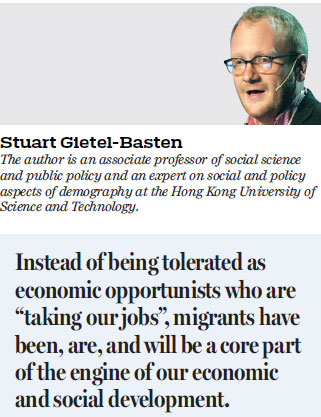Multi-pronged strategy needed to tackle city's labor-shortage crisis
Updated: 2017-11-30 06:25
(HK Edition)
|
|||||||
Stuart Gietel-Basten says that an aging city means fewer workers and simultaneously more demand for them; the time has come for a comprehensive study of migrants
Hong Kong's demographic reality is that we have both one of the lowest fertility rates and longest life-expectancies in the world. It is common knowledge that the rapid pace of aging that comes with these demographic circumstances will greatly affect our well-being and future economic development. This will be especially keenly felt in the workforce even in the short term.
Earlier this year, the Food and Health Bureau identified future staffing shortages in nine occupations as a consequence of population aging alone. These included doctors, nurses, dentists, occupational therapists and physiotherapists.
We also need to recognize that such highly skilled jobs will need to be supplemented by an ever-greater supply of basic labor. Advances in technology will almost certainly lessen the reliance upon human hands in the medium- to long-term. But the reality - and the situation the government is planning for - is that domestic helpers will play a central role in supporting our growing elderly population.

Of course, the labor demands of an aging population are only one aspect of the workforce challenges for Hong Kong. Sectors such as construction and hospitality consistently struggle to fill their jobs. The consequences of having to choose between childcare and work are a well-documented headache for both women themselves and for human resources departments across the territory.
Activating the local workforce is a critical dimension in solving these labor shortages. In the construction industry, for example, Hong Kong urgently needs a comprehensive apprenticeship system with career-long professional development and job security. Retraining and life-long learning can let people move into jobs at different times of their lives. Better policies to let parents combine work and childcare can free up more labor still, as can breaking down gender stereotypes about what jobs men and women "should do". All of these are urgently needed; but will inevitably take time to identify, implement and see any appreciable effect.
Hong Kong, unlike its neighbors in Japan and South Korea, has always had an "ace up its sleeve" to deal with these labor shortages and mismatches: a liberal immigration policy. The simplest solution, then, is further liberalization of migration - opening up our labor market to other places; simplifying the process of immigration and settlement; taking a proactive approach to recruitment abroad and so on.
This approach, however, is not without its challenges. Firstly, while economists and employers like liberal migration policies; many other people do not. The threat to undermining local culture, wages, and prevailing work systems is in the back of many minds. Studies frequently show the macroeconomic benefits of migration to GDP but this is not always felt at the individual level. Any future liberalization of migration policy will face many political challenges.
Secondly, it has always been easy to recruit "talent" from around the world; not least because Hong Kong has been seen as a great place to live and to build a career. The vast pool of labor both on the other side of the "soft" border as well elsewhere in Asia has perhaps lulled Hong Kong into a false sense of security.
But the new demographic and economic reality is not only present in Hong Kong. It can be seen across the region. As Chinese mainland's economic growth continues apace and as the cost of living in Hong Kong grows, the economic incentives to cross the border to work are becoming lower and lower. Similarly, as neighboring countries age themselves, and the Asian middle class grows, competition for labor will only increase. The economic and demographic reality of Southeast Asia, for example, shows us that an era of "excess", cheap labor is rapidly coming to an end. In a world where, despite what you might think, people are becoming ever scarcer, Hong Kong has to become a better place to move to.
The challenge of creating a policy which is not only more liberal in terms of entry and settlement but also one which is more proactive in supporting migrants in their lives in Hong Kong may well be a difficult one to sell. The only way this can be achieved is by presenting a whole new narrative on who migrants are, and what they contribute to our society. Instead of being tolerated as economic opportunists who are "taking our jobs", migrants have been, are, and will be a core part of the engine of our economic and social development. It is not too early for us to conduct a comprehensive study of all these inter-related issues in pursuit of a realistic policy that addresses our many demographic and economic challenges.
(HK Edition 11/30/2017 page7)